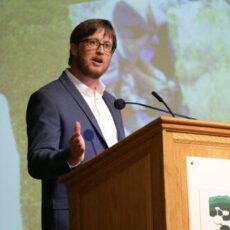Watch the recording.
From Forests to Farmlands: Navigating the Tradeoffs in Land Use for Renewable Energy
Event Summary
As the U.S. accelerates its clean energy transition, land use conflicts between renewable energy infrastructure and agricultural or forested landscapes have become increasingly important. States are grappling with this challenge in various ways. In Massachusetts the installation of ground-mount solar systems has led to notable losses in forest carbon, biodiversity, and agricultural land productivity since 2010. This discussion will examine the tradeoffs involved in siting renewable energy projects in the Northeast and beyond. Join us to explore strategies for scaling solar energy responsibly, ensuring that we preserve the environmental and cultural values of natural and working lands.
This event is part of Energy Week at Penn. Check out the rest of the 2025 programming at energyweek.upenn.edu.

Jonathan Thompson
Senior Ecologist and Research Director, Harvard ForestJonathan Thompson is a forest landscape ecologist whose research focuses on long-term and broad-scale changes in forest ecosystems. He is the Principal Investigator for the Harvard Forest Long Term Ecological Research (LTER) program, sponsored by the National Science Foundation.
Grace Wu
Assistant Professor, UC Santa BarbaraGrace Wu is an assistant professor in the environmental studies program at UC Santa Barbara. Before joining UCSB, Grace was a Smith Conservation Fellow at The Nature Conservancy and the National Center for Ecological Analysis and Synthesis.
Andrew Hoffman
Dean, Penn VetAndrew Hoffman is dean of the University of Pennsylvania School of Veterinary Medicine. An acclaimed researcher, clinician, teacher, and mentor, Dean Hoffman previously served as Director of the Regenerative Medicine Laboratory and Professor of Large Animal Internal Medicine at Tufts University.



